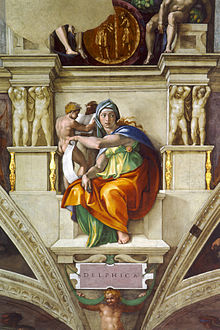- Delphic Sibyl
-
The Delphic Sibyl was a legendary figure who made prophecies in the sacred precinct of Apollo at Delphi, on the slopes of Mount Parnassus. According to a late source, her mother was Lamia, daughter of Poseidon.[1][2] The Delphic Sibyl was not involved in the operation of the Delphic Oracle and should be considered distinct from the Pythia, the priestess of Apollo.[3]
There were several prophetic figures called Sibyls in the Graeco-Roman world. The most famous Sibyl was located at Cumae. There are a number of legends about the Delphic Sibyl, though they are not necessarily all consistent. One claims is that her last prophecy was said to be the birth of Jesus Christ.[citation needed] Pausanias claimed (10.14.1) that the Sibyl was "born between man and goddess, daughter of sea monsters and an immortal nymph". Others said she was the sister or daughter of Apollo.
The Sibyl came from the Troad to Delphi before the Trojan War, "in wrath with her brother Apollo", lingered for a time at Samos, visited Claros and Delos, and died in the Troad, after surviving nine generations of men. After her death, it was said that she became a wandering voice that still brought to the ears of men tidings of the future wrapped in dark riddles.
See also
References
- ^ Pausanias, Description of Greece. Cf. 10.12.1 and onwards.
- ^ Pausanias Description of Greece, 1824, notes by Thomas Taylor. Cf. v.III, ch.12, pp.117-120
- ^ Bowden, Hugh, Classical Athens and the Delphic Oracle. Divination and Democracy. Cambridge: Cambridge University Press, 2005. ISBN 0-521-53081-4. Cf. p.14. "They may learn about the mysterious Delphic Sibyl, a mythical prophetess unrelated to the traditions of the oracle itself."
- Goodrich, Norma Lorre, Priestesses, 1990.
- Hamilton, Edith (1942). Mythology. Little, Brown and Company. ISBN 0-316-34114-2.
- Mitford, William, The History of Greece, 1784. Cf. Chapter II, Religion of the Early Greeks.
- Parke, Herbert William, History of the Delphic Oracle, 1939.
- Parke, Herbert William, Sibyls and Sibylline Prophecy, 1988.
- Pausanias, Description of Greece, (ed. and translated with commentary by Sir James Frazer), 1913 edition. Cf. v.5
- Potter, David Stone. Prophecy and history in the crisis of the Roman Empire: a historical commentary on the Thirteenth Sibylline Oracle, 1990. Cf. Chapter 3.
- West, Martin Litchfield, The Orphic Poems, 1983. Cf. especially p. 147.
External links
- Suda: Delphic Sibyl from Suda On-Line. The Suda is a 10th century Byzantine encyclopedia, incorporating earlier material.
- Tim Spalding, "The Oracle of Delphi and ancient oracles" An annotated guide.
- The Oracle of Apollo is an online tribute to the magic and mystery of the Delphic Oracle.
Categories:- Classical oracles
- Sibyls
- Ancient Greek religion
- Delphi
Wikimedia Foundation. 2010.

